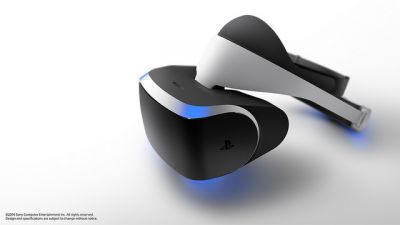
 Sony Executive claims Project Morpheus will revolutionise gaming
Sony Executive claims Project Morpheus will revolutionise gaming
Other | Monday 1st December 2014 | Matt
Yesterday Sony Computer Entertainment America (SCEA) chief executive Shawn Layden spoke to the Financial Times in a bid to allay many investors' suspicions that the company's long awaited VR bid, Project Morpheus, will prove to be anything more than a niche hit among consumers.
Despite high profile endorsement from Shuhei Yoshida, president of Sony's Worldwide Studios, other executives have been markedly more reticent to support the company's latest venture. In the interview, Layden puts across a more positive and assertive vision for the company's most recent undertaking, stating: "In a couple of years from now, we are going to see virtual reality changing the entire gaming experience."
He also outlines potential for the tech to expand into other areas outside of gaming, with the FT suggesting that Sony has been approached by more than 100 companies outside of the industry to implement virtual reality in a diverse range of areas, from education and travel to live sports coverage. However, Layden is keen to emphasise that any future diversification must be built on success in the gaming medium: "We have to concentrate on delivering this VR experience in a meaningful and attractive way in the gaming world first. Without success in that realm, it would be difficult to start branching off."

Critics of the new technology have been quick to dismiss Layden's comments, claiming that these are strong words from a company whose past experience with separate gaming peripherals has been somewhat patchy, with neither the EyeToy or Playstation Move ever truly transcending the bounds of the gimmick. However, in reality such comparisons are ultimately fallacious and unhelpful in charting the future impact of Sony's VR venture. Whilst previous efforts to add an extra element to the gameplay experience have been hindered by limitations in technology and ambition, Project Morpheus represents the apotheosis of the gaming world's obsession with that hitherto meaningless word 'immersion'.
Originally employed solely to communicate the preternatural ability of videogames to transport us to another world, free from the troubles of everyday life, in recent years companies have begun to rhetorically highjack the word, and all variations thereof, as a synonym for graphical fidelity. However, the ability of Project Morpheus and Oculus Rift to subvert this definition by offering instant, physical 'immersion' in the truest sense looks set to change the way we talk about games.
The difficulty of rendering AAA games for VR platforms so far suggests that the developers may be free to shift their focus away from the graphical arms race that has dominated the industry for several years, and move into more diverse and experimental thematic and stylistic territory.
Such seismic potential is intensely exciting for the medium, and Layden is understandably coy about a fixed release schedule. When pressed on the issue, he remarks that Morpheus will be released "not only when we have the technology, and the production costs and the hardware issues completely worked out, but also when we have the right experience."
Despite his reticence towards announcing anything close to a release date, this kind of talk is encouraging. It speaks to a commitment from Sony's executives to remember that, whether Morpheus succeeds or fails, it will ultimately be measured by the impact it has on the industry it was developed for, and not the extra-curricular activities it is no doubt capable of.
